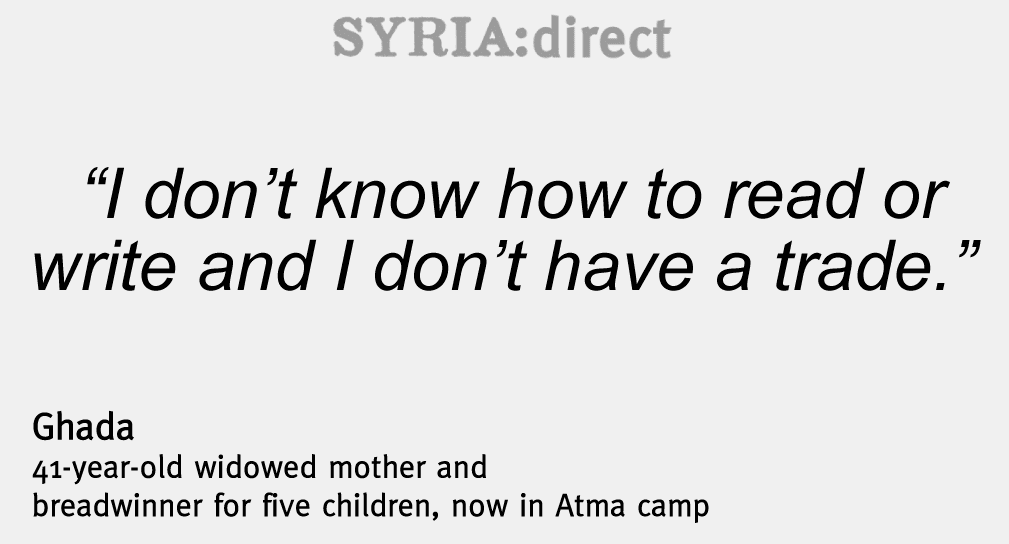Life in an encampment on the Turkish border: Two war widows tell their stories
An estimated 3.2 million women and girls are among the […]
8 March 2016
An estimated 3.2 million women and girls are among the 6.6 million internally displaced inside Syria, according to a report in late 2015 by the United Nations Office for the Coordination of Humanitarian Affairs.
On International Women’s Day, Syria Direct’s Bahira al-Zarier spoke with two internally displaced women, both of whom reside in the Atma refugee camp in northern Idlib. They requested their last names not be published.
The Atma camp comprises more than 50 sub-encampments scattered along the Syrian-Turkish border in the rebel-controlled Idlib countryside. The area serves as a temporary home for an estimtated 60,000 displaced Syrians.
Rami Ayoub, director of one of the aid organizations working in Atma, described “immense” overcrowding, inadequate health services, lack of shelter and the spread of disease in the camp in an interview with Syria Direct last month.
“With every day that passes I remember my children, my husband, my lost home and how my situation has changed,” says Fatima, 36-year-old schoolteacher from the east Homs countryside who lost her husband and three children to an airstrike in late 2014.
Ghada, a 41-year-old widowed mother of five children who bakes and sells bread in the camp, still hopes for a better life for her children than her own. “I don’t know how to read or write and I don’t have a trade, she says. “I was adamant that my children go to the school in the camp.”
Fatima, a 36-year-old schoolteacher, originally from Qaryatayn in the east Homs countryside
I used to be married with three children. In late 2014, my husband and children were killed by bombardment in our east Homs town, while I escaped with light injuries. Later, when the Islamic State came I was forced to flee alongside most of the residents of Qaryatayn and came to the Atma camp, suffering a lot to get here.
The situation in the camp, where I share a tent with an elderly widow, is bad in every way. There are no bathrooms or sanitation facilities, no electricity and a severe shortage of heating materials.
Despite the bad circumstances in the camp after losing my husband and children, I have turned my tent into a place to teach the camp’s children to write.
I’ve gone beyond my profession to provide love, tenderness and hope to these children in the place of my own children who I have lost.
One year and three months have passed since I first found myself in the Atma camp. With every day that passes I remember my children, my husband, my lost home and how my situation has changed.
All that has only increased my belief that the children I am teaching are the ones who will build Syria in the future.
Ghada, 41-year-old widowed mother and breadwinner for five children, originally from Darat Izza in the western Aleppo countryside
My husband died and my house was destroyed in the bombing of Darat Izza two years ago. I tried to enter Turkey, but the border was closed, so I headed with my children to Atma.
I don’t know how to read or write and I don’t have a trade. I was adamant that my children go to the school in the camp, which is a group of tents. My children, the oldest of which is my 15-year-old son, are excelling in school.
Having lost my house and my husband, I refuse to lose my children’s future. I have become both a mother and a father to them at the same time.
I make and sell saj bread, which gives me an income, so I am not forced to wait for aid, of which there is very little if it comes at all.
I will remain hopeful about returning to Syria without a war.







